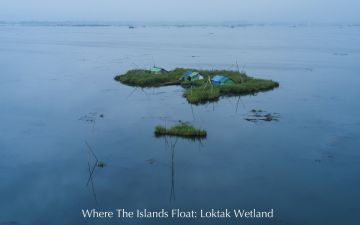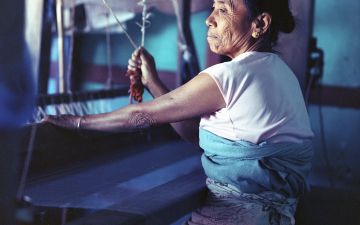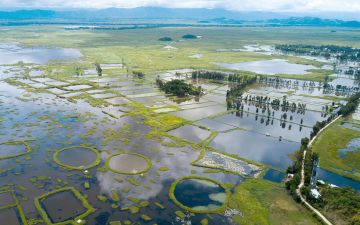From space, Loktak Lake, located in Manipur, India, looks, unlike any other lake. It appears like a luscious sapphire-colored fabric with velvety green polka dots of varying sizes. Loktak Lake is one-of-a-kind wetland ecosystem that has been designated a Wetland of International Importance through the Ramsar Treaty. The numerous green areas that cover nearly two-thirds of the lake’s 236 square kilometers are called "phumdi" or floating islands comprised of vegetation, soil, and other organic matter. Unique to Loktak Lake, phumdis change shape according to the season and move around the lake surface, playing a critical role in water cleansing, nutrient absorption, flood control, and carbon sequestration. Phumdis are home to over 400 species of animals, including the endangered “dancing deer;” over 100 species of birds; and over 200 species of aquatic plants. Loktak Lake is home and means of livelihood to more than 700 indigenous families. The lives of over 100,000 people are socio-economically connected to the lake. A hydroelectric dam, various infrastructure projects, regional armed conflict and climate change threaten this unique ecosystem.
Loktak Wetland
The floating islands of Loktak Lake, known as “phumdis,” home to unique animals and plants and an indigenous community, are threatened by development, climate change, and conflict.
Loktak Wetland: Caught Between Development, Conflict, and Climate Change
This photo essay documents how the Ithai hydroelectric dam, infrastructure projects, regional armed conflict, and climate change threaten the Loktak Wetland.
Manipur: Portraits of Resilience
Portraits of Resilience takes viewers up close to nine individuals to understand the delicate relationship between the Meiteis and the Loktak Wetland as well as their fight for survival.
Manipur: Ithai Dam Threatens the Loktak Wetland
The floating islands of Loktak Lake, known as “phumdis,” are home to unique animals and plants and an indigenous community threatened by a hydroelectric project.
IWMF Awards to 2 Pulitzer Center Student Fellow Alums
Student fellow alum Pat Nabong from the Medill School of Journalism was named a Gwen Ifill Fellow by the International Women's Media Foundation (IWMF), while Neeta Satam, student fellow alum from the Missouri School of Journalism was awarded an IWMF Reproductive Health, Rights, and Justice in the Americas grant.
SPJ Selects Seven Student Fellows as Mark of Excellence Regional Award Finalists
The annual Mark of Excellence Awards are presented to students in the categories of print, radio, television, and online collegiate journalism.
Multiple Student Fellows Selected for 2017 SPJ Mark of Excellence Awards
Several Student Fellows are awarded the 2017 Society of Professional Journalists regional Mark of Excellence Awards.






